Help Me, For I Have Pine Mouth!
by Clarence Rosario
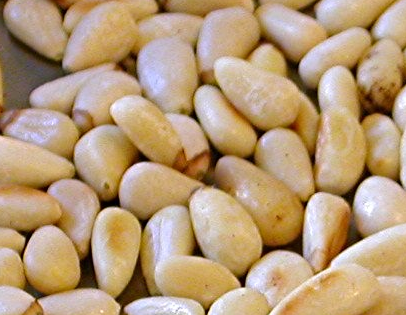
From time to time, The Awl offers space to ordinary citizens to discuss their bizarre medical issues. This is one such time!
As if we don’t have enough to worry about! As a species, we no longer have natural predators (well, aside from BP and the Tea Partiers), but we have a host of what Tricky might have dubbed Post-Millennium Tension. Is the Internet going to make me dumb? Are The Machines going to kill me? Am I drinking too much, or more importantly, the right drinks? Will the Red Wings re-sign Nick Lidstrom? Am I taking the appropriate drugs to cope with all of this? Well, you can add the pine nut to the list of postmodern boogeymen. The fucking pine nut.
Surely such a bourgeois TOPPING surely poses about as much risk to our fragile lives as, say, kombucha, or doggie yoga.
Well, that’s what I thought, until I too was stricken with pine mouth.
We’ll let the professionals describe it:
A small minority of pine nuts can cause taste disturbances, developing 1–3 days after consumption and lasting for days or weeks. A bitter, metallic taste is described. Though very unpleasant, there are no lasting effects. This phenomenon was first described in a scientific paper in 2001. Some publications have made reference to this phenomenon as “pine mouth”. This is a relatively new phenomenon and appears to be most common in nuts coming from China.
Like you, I hadn’t heard boo about this phenomenon. Then Monday, my morning coffee tasted bitter, the cereal metallic. Simple crackers ere astringent. I thought I’d gotten some bad milk, used an unrinsed bowl, or mishandled pet medication (the mutt had upset tummy). Anything I ate or drank was ruined by an immediate sour taste in the back of my mouth, like licking a battery.
Naturally, my first instinct was to kill it with gin and vodka (and Lillet Blanc: it’s called a Vesper, it’s lovely, and I drank it long before Daniel Craig). It was like gargling with aluminum foil, aspirin and pine needles.
Being genetically predisposed to hypochondria, I started to worry.
The next morning, same drill: deli coffee more unpalatable than usual, yogurt medicinal. I turned to Google in a slight panic, expecting “bitter taste in back of mouth” to return results for brain cancer, heavy metal toxicity, liver failure. Among the occasional “acid reflux” references (one thing I’m pretty sure I DON’T have), I saw a lot of “pine nuts.”
And then I recalled that my wife’s dessert from Saturday night contained pine nuts. (It was delicious, BTW, sweetie!)
Even so, there’s still not much to go on. A smattering of blog posts, a 2001 study from the EU, a random USA Today article.
Still, those, along with dozens of comments on those pieces, revealed the common, unmistakable symptoms of pine mouth. The phenomenon seems to have snowballed over the past year, and has really accelerated this spring. Some of those blog posts are still getting new comments, over a year later. People are crawling out of the woodwork with similar tales of pine mouth, and it’s not hard to understand why.
You’re terrified that you are going insane. Everything tastes like you are choking on lemon zest.
And boy, does it suck. As I, and other sufferers, have agreed: EVERYTHING you eat or drink is ruined by an immediate, lingering taste that is sour, soapy, metallic and medicinal. Food and booze completely lose appeal. It makes me not want to drink! It is THAT SERIOUS!
The Poors and Republicans don’t have to worry about this affliction. For one, their taste buds likely have been blowtorched by stuff like the KFC Double Down. Also, they don’t eat pesto. They certainly don’t buy their pine nuts (for $9.99!) at Union Market because they are not hippie enough too lazy to join the Food Co-Op. Many pine mouth sufferers report buying them at Trader Joe’s, for fuck’s sake. These little joy-destroyers didn’t come from Costco or Sam’s Club or Wal-Mart.
But they did come from China.
With little actual definitive data, one strong consensus is that Chinese pine nuts are leading culprits in causing pine mouth. Really? This is what we have to worry about now? That the Chinese are coming for our palates? All weekend long, I’ll be burdened to know that there’s a shitty Red Dawn remake going on in my mouth.
Clarence Rosario lives in Brooklyn, works in Manhattan, and comments fucking EVERYWHERE. He half-assedly blogs here. He’s got a screenplay in him, and he keeps telling himself that.
Jersey Mayhem: Put It On Vibrate, Or Electrocute

Twenty-two-year-old Lawrence Guagliardo was arrested in Middletown, New Jersey on Monday for possession of heroin and weapons. One of the weapons was, as the Asbury Park Press reports, “a fully functional stun gun disguised as a cell phone.” The guy was already in enough trouble when he attempted to sell heroin to an undercover cop, he definitely shouldn’t have tried the old “Oh, here, it’s for you” earlobe-shocker gag.
Me Against The World

It’s not, generally speaking, a good idea to read too much into a Nike commercial. Maybe if you’re Naomi Klein, seeking a way in to an examination of the dozens of interlocking injustices behind the brand’s bleakly glib brand of vicious uplift, but almost definitely not if you’re a sportswriter type trying to pin down why you feel weird on the first day of the largest sports event in the world. This isn’t to say that Nike commercials don’t have something (gross and weird) to say about sports on occasion, but relying on Nike’s reliably grandiose advertisements for anything other than a reflection of what makes Nike so squeamy is not necessary a good look. And yet: here I am, and here you are, and here is what is actually a pretty impressive and obviously hugely expensive long-form Nike commercial directed by Alejandro Gonzalez Inarritu. It’s being hailed as one of the great commercials of all time, and it has been viewed over 14 million times. And while I can’t say it makes me want to buy Nikes as much as it makes me want to barf at the sadness of this crew of Special Economic Zone profiteers dropping $24 million on a freaking commercial, I have to say: the commercial does go some of the way towards explaining why I’m feeling more dazed than anything else as the World Cup begins.
Like most Nike ads, this one deals in weapons-grade overstatement. But unlike the new breed of Nike ads, which have disproportionately featured intense black athletes turning into monsters of late, Inarritu’s deals with a sports-related theme that makes sense. Instead of working the “that moisture-wicking workout gear looks fucking terrifying” marketing angle, Inarritu’s commercial gets at the outlandishly high stakes of World Cup soccer. This will be redundant if you’ve already watched the commercial-and you should, it’s a damn sight better than 21 Grams-but the ad’s general thrust is that each play in the World Cup could make or break both a player’s career and life and a nation’s spirit. While Inarritu kids the idea somewhat-a blown pass leaves England’s Wayne Rooney looking like a bearded Jason Statham and living in a trailer on some Knifecrime Isle heath; a converted free kick earns Portugal’s Cristiano Ronaldo a gaudy Michael Jackson HIStory promo tour-style statue in downtown Lisbon-the joke is one of degree, not of kind. This stuff matters a lot to a whole lot of people, is what I’m saying. Certainly a great deal more than I, personally, can comprehend. If it weren’t for the cameos by Homer Simpson and Kobe Bryant and Gael Garcia Bernal-$24 million, peoples-I’m not even sure I would’ve known the commercial was a joke.
I’m a serious enough sports fan that I’m supposed to offer some perspective on this particular lack of perspective. Lord knows I understand the sports fan’s lack of perspective well enough myself: I once wrote 1,200 anguished words on the New York Mets’ (former) fifth outfielder, and I’ll probably write something roughly that embarrassingly overwrought again soon enough. But when it comes to international soccer, I find myself on the outside and thus sadly and irretrievably in-perspective. I enjoy watching World Cup games well enough, and I love-because I’m one of those literary squeaker sports fans; if something goes horribly wrong, I could well become a George Will-type in a couple decades-the macro-scale stories of soccer-related uplift, unification, national aspiration, and so on. (Here’s a really good one.) But whatever haywire nervous response in my otherwise functioning brain makes me to go absolutely the-dinner-is-ruined apeshit over the humpy grab-bag that is the Mets bullpen has somehow decided to more or less sit out this grand-scale competition between nations in the most popular sport in the world. I can get into a middling tennis match or regular season NBA “action” with the quickness, I’ve watched fucking golf (albeit for work) and even kind of liked it, but I just can’t seem to get as close to the World Cup as I feel like I should.
Which is weird, because while I don’t play soccer and haven’t since I was in middle school, I really do appreciate it as a game. It can occasionally be slow going to those of us who don’t get the stylistic fine points, and it’s easy enough to make fun of, but the Beautiful Game is at the very least kind of pretty even for non-experts. The best soccer players in the world are as- or more-dazzling to watch than their counterparts in other sports, and the sudden transcendence of a brilliant goal-that instant and invisible shift from tense entropy to something graceful and remarkably different-is amazing stuff. As a relative soccer n00b, I’m constantly wowed by the otherworldly weirdness of what goes on at international soccer games, too. The 32 teams in the World Cup means that there are at least 32 different songs being sung during games, all game. During the 2006 World Cup, fans adopted a weird a capella version of the White Stripes “7 Nation Army” as a multinational fight song. The sport’s jargon is colorful, the team names even more so-Nigeria’s team is (are?) the Super Eagles, Australia’s are known as the Socceroos-and the sense of each play’s import translates pretty well even if you’re watching by yourself. The nonstop vuvuzela soundtrack you’ll hear in many games-plastic horns blown by fans throughout the match that add rush-hour-in-Karachi ambient noise to the proceedings-is annoying, but I can charge it to the game easily enough. It’s their game, after all. “They,” in that sentence, being “just about everyone in the entire freaking world.”
And while it’s not like “they” don’t want to share the experience, and while it’s not like the World Cup’s entire marketing scheme isn’t based on just the sort of We Are One uplift that should appeal to my goofily bleeding heart-they do want to share it and those World Cup ads might as well be a joint production between Benetton and the United Nations-there’s something self-conscious in me that can’t quite fully accept this (actually very generous) gift. It’s not like I want to be out here with the unbelievers, either-soccer skeptics are a sour bunch, split between know-nothing buttheads like New York sports radio colossus and human veal chop Mike Francesa and right wing anti-worlders who think soccer is socialist because America’s not the best at it or whatever. I don’t want to hang out with these guys, and I promise you I’d rather be doing some elaborate chanting thing with the hyped-up Paraguayans. I can’t quite manage either, though.
Soccer is one of the few sports I didn’t play at least for fun later into my life, and that may have something to do with it. And some American soccer fans can be kind of annoying, both in their corny know-it-all-ism and the occasional overreach of their conosseurship-soccer, somehow, is an elite sport in the U.S. and an all-things-to-all-people deal basically everywhere else. But I don’t think any of those things explain the distance I feel from the start of the World Cup relative to, say, the freaking-out-man excitement I get during the first days of March Madness.
The closest I can come to describing it, I guess, is to compare it to that feeling you get when you’re traveling somewhere extra foreign. Imagine that you don’t speak the language, that the traffic is heavy and loud, that the sidewalks are narrow and crowded and jostly. It’s hot, and men are arguing with each other, how good-naturedly it’s tough to tell. Weird fried street food for sale all over the fucking place. A square opens up around a corner and reveals a statue of a great national figure of some sort or another. People are taking pictures, local tourists posing solemnly in front of it-they took some crazy train ride from the other side of the country to get that photo taken. And there you are/here I am, staring up, flipping through the guidebook and trying to figure out just who the hell that even is up there. In this case, as in Inarritu’s Nike commercial, it turns out to be Cristiano Ronaldo. The hugeness of the statue and the crowd around it doesn’t make any of it any easier to feel what they’re feeling, but… yeah, it is pretty impressive all the same.
David Roth is a writer from New Jersey who lives in New York. He co-writes the Wall Street Journal’s Daily Fix, contributes to the sports blog Can’t Stop the Bleeding and has his own little website. His favorite Van Halen song is “Hot For Teacher.”
Everyone Agrees: That Second Circuit NYPD Decision Blows
This decision by the Second Circuit that the NYPD can keep secret all its documentation about spying on Americans and making mass arrests at the 2004 Republican Convention (which cost the city millions in settlements, let’s not forget) is a terrible piece of horseshit.
Tales from Brooklyn: Short Stories About Love (Actually Sex): Part 6
by T. J. Clarke
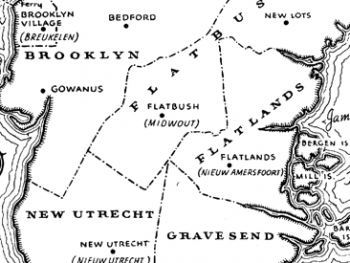
“Fancy seeing you here.” Jason drapes his arm around my shoulder, his chest already in position for a fake friendly half-hug.
Devon and I are sitting at the bar, waiting for our table and first round of drinks. He always orders the turkey leg sandwich, but he is still reading the menu. He doesn’t even look up when Jason stands right next to him.
“So what’s new with you?” Jason puts his hand on the bar, though his arm is still behind my back. He is close enough to kiss. Our waitress drops off our drinks and another menu for Jason: Coke for Devon, an old-fashioned martini for me. I want to drink up everything and leave. But neither leaving Devon nor dragging him along seems like viable options.
“Same old stuff. Exams. Graduation. You?” I pick up my glass to take a sip, but gulp down half of the drink instead.
“Slow down there tiger.” He has the same devilish smile. “What are you drinking?”
“Martini.” I look around the room for our waitress. I need our table to be available now. A small crowd is forming in the bar’s entryway. The dinner-hour rush is commencing. I spot one couple possibly on their first date. The man stands with his hands folded in the front, holding a jacket. Burberry plaids. The woman is wearing a short, pink cocktail dress and heels. He turns toward her and says something, she smiles wanly.
“What’s good here?” He is lingering.
“The burger is good. The Wilkinsons are good.” I finish my drink and make a big show of looking for the waitress. I look to Devon for some conversational assistance; his attention remains focused on the menu. Damn little boys.
“Oh, I have heard about those Wilkinsons.” Jason doesn’t want to go away. “You finished your drink awfully quickly. Long day?”
“Yes.” I put the lemon rind left in the glass in my mouth. It is soaked with gin and delicious.
Our waitress finally appears. She is beaming. “Your table is ready.” Seeing Jason, she asks, “do you need a third chair?”
The expression on his face changes from cute to cold. “Oh no, thanks. I’m meeting other people.” He leans in and hugs me again. “It’s good seein’ ya.”
The impatient diners have migrated from the entrance to occupy almost all of the front room, crowding the bar. Devon passes between Jason and me to follow the waitress to the back dining room. I lean in close to Jason, to make sure that he hears me above the dinging glasses and chattering imbibers. “Wish I could say the same.”
When our dinner arrives, I am already halfway through my third martini of the night. Devon sips his first glass of coke. I check the time on my phone: Eight. Nan had only left for the airport half an hour ago.
“Can I get you anything else?” Our waitress comes by the table with hot sauce and mustard. “How is the turkey leg?” She asks Devon, who looks up and nods, but doesn’t say a word. The waitress is wearing a tight white t-shirt, suspenders, and a dark-colored lace bra that is hard to ignore. Her eyelids are painted shades of turquoise and azure. “Another coke for you?” She smiles broadly and leans in close to Devon’s face when she picks up the still half-full glass.
Devon nods, eyes looking down at his plate.
“Here you go.” She is back in seconds with a tall glass of coke and a small plate of fries. “These are on the house,” she says with a teasing lilt in her voice.
Devon is silent. I arrange the plate of fries between our water glasses. “Thank you,” I say to our waitress with a smile. Devon’s cheeks, though, are now a fine hue of fuchsia. I want to kiss his forehead and assure him that it is okay to flirt back; women will be flirting with him all the rest of his life, just for his black hair and blue eyes. Instead I pour out more ketchup onto the fries. The moment for advice-giving passes as we finish our dinner in silence.
On our way out, I see that Jason is still at the bar, talking and laughing with other people from law school. We had met two years ago. He left me on a Thursday night. We weren’t dating but had said “I love you.” To make him stay just a while longer I blocked the door and stripped naked and sucked his cock and kept blocking the door until his phone rang Chopin’s Nocturne. It was his fiancée.
“Let me go.” He growled.
I put on my shirt and moved out of the way.
The night air outside of the bar is brisk. Cars rush down Atlantic Avenue in both directions. I know what the East River smells like: metal and dust. I never said anything to Dree about Jason because I didn’t want to explain. I want her to be mine, untainted.
“Our waitress was cute,” I say.
“Yeah,” says Devon.
T. J. Clarke is the pen name of a struggling writer. She lives in Brooklyn.
Alvin Greene Update
The Alvin Greene situation in South Carolina is indeed getting weirder. Election experts analyzing the ballots in the state’s Democratic primary for the U.S. Senate (in which Greene, an unknown homeless veteran who had no campaign operation at all, beat a former four-term legislator) are discovering some unusual disparities. A co-worker of Your Geeky Boyfriend Nate Silver looks at the possibilities.
Cascading Campanula

With spring almost a fading memory, the June garden offers more subdued and textured pleasures. The deciduous trees have leafed out, the tips of the conifers-which just a few weeks ago were shimmering and almost translucent-have matured, and the deep burgundy tones of the Japanese maple and columnar beech have been diluted with a more pedestrian if not completely unsatisfying green. Not that I’m complaining: there’s still much to look forward to during what remains of the growing season before the August doldrums, and if anything, later arrivals in the garden should be all the more valued as a result of our awareness of the limited time that remains.
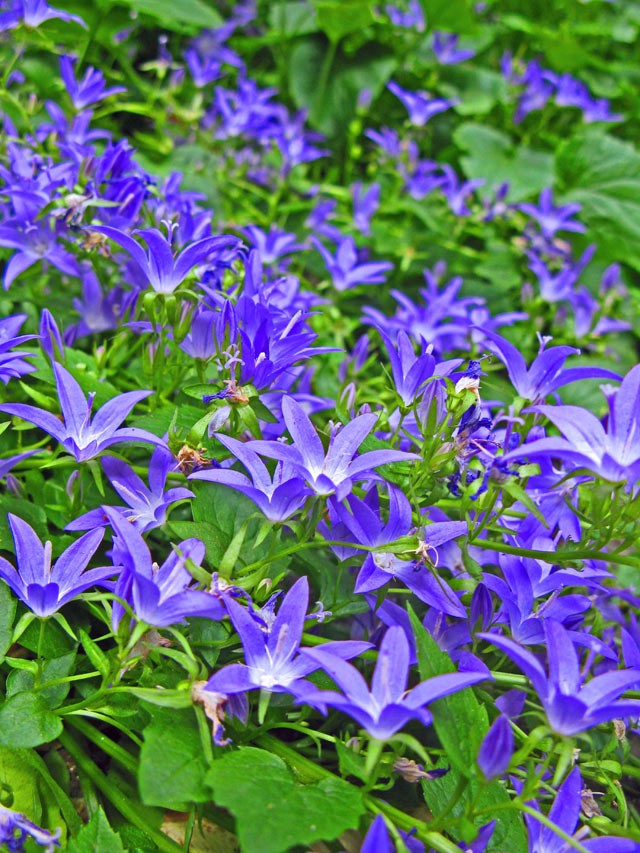
No doubt other plant lovers have their favorites during this time of year; for me and Stephen, the Adriatic Bellflower (Campanula garganica) takes center stage. Our campanula is a low, spreading variety that occupies a promontory overlooking a sea of moss-covered brick. It gets nice early-morning sun and (thanks to us, if not always Mother Nature) ample water and organic, fishy-smelling fertilizer, which is all it needs to send forth a carpet of blossom-covered tendrils to cascade over the rocks.

I can’t use the word “cascade” without thinking of our friend T, a rather large, garrulous, and for that reason, perhaps imposing man who used to spend summers with his boyfriend in Tarrytown, where his flower boxes of cascading annuals attracted the attention of a local outfit, the Ladies Village Improvement Society, or something similar. One day some representatives knocked on his door and asked if “the lady of the house” was present because they wanted to invite her to join. “You’re looking at her,” he responded archly, which at the time (the late 80s) caused shockwaves to ripple through the Westchester gardening community. Recently I overheard some young queen refer to his love of “hanging” or “falling” plants and I felt compelled to pass along this important terminology: if you’re going to embrace a life in the garden, there’s little point in going halfway.

Last weekend a much younger friend joined us for dinner. In the early-June heat we admired the flowering blue stars and discussed our friend’s imminent travel plans, which include a long-anticipated vacation to ___ and ___, countries he has never before visited, but which Stephen (who has) assured him has gorgeous beaches and famous cruising grounds populated by legions of very attractive non-heterosexual men. “I am so getting fucked every single night of this trip,” our young guest did not so much confess as proclaim, and I appreciated his candor and enthusiasm, particularly when I compared it to the sad, overwrought inhibition I suffered at his age. My mother often likes to try to convince me (or more to the point, herself) that society is improving for non-heterosexuals, and as evidence of this she regularly points to the inclusion of gay kids at high-school proms around the country. “I guess that’s promising,” I usually say to her, and there’s a part of me that wants to believe; after all, there’s a new generation at hand, and I try to take the same comfort in their existence as I do the new flowers in the garden.
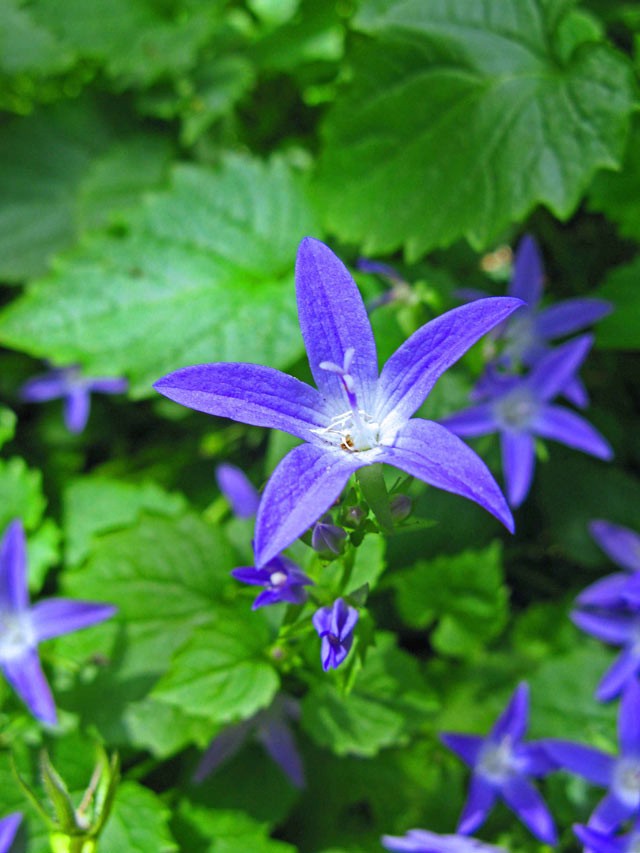
“Would you like to visit the Adriatic Sea, home of our lovely bellflower?” I asked Stephen after our young friend had left. “Maybe someday,” he offered after a few moments of consideration, but with a kind of wistfulness I understood. Traveling more than a day or two-what with the expense and airport ordeals and abandonment of our cats and dread of returning to the same problems we left behind-has lost some of the appeal it once held for us. These days, we’re more inclined to stay in the garden and watch the campanula bloom, creating the illusion of a night sky, allowing us to remain insulated from the larger and more maddening uncertainties of the larger world beyond.
Matthew Gallaway is a writer who lives in Washington Heights. Come, let us go together and learn all about his first novel, The Metropolis Case
.
The Poetry Section: Kathleen Ossip
by Mark Bibbins, Editor

Today in the poetry section; two new poems by Kathleen Ossip.
On Political Crisis
Grace Success consists in ignoring
what you don’t like, as a bunny
leaps past tinfoil
in his search for greens.
You don’t need spring fever
in a garden of tinfoil;
to seize the choice bit
in place of the glittering
or the made-up
means the whole plot
will be changed, gladly.
In the vicinity,
all relish posturings;
the problem is how to remain chaste
next to so many furry bodies
when those we thought would cuddle us,
whether weeping or jeering,
have fled.
The problem is how to remain.
Words are no doorstep whatsoever
for the orphaned and penniless.
The hop to the shed
is driven by wanting
to fill the wreck with delights reordering.
How can we know the journey from the path?
Keep a clean nose
Watch the plain clothes
-Bob Dylan
A lone tumbleweed bounces by
the institutions of power
and the institutions of power or
the daisies in front of the institutions of power
are my last big chance at a voice.
A lone tumbleweed bounces by.
Am I morally obligated to care for this organism
or can I kill it? I’m loving my
desperate organism.
Talking in class was “pretty cool” at one time,
my last big chance at a voice. I wanted to
go play bingo and breakfast at IHOP.
Now, everything’s not OK or
not everything’s OK. Heavenly daisies,
though. Mary Queen of Heaven
in the prayerbook
bare toes crushing the serpent
looked silly. And the institutions of power
look silly if you’re from them in-
sulated enough. They’re losing their suits
in the institutions of power. Helen
Vendler’s looking “mighty like” Sasha Fierce.
Both have expert memories of those
who appreciate their bitchy science.
The beauty’s only part of it.
Perseverance is beautiful, and embarrassing.
How many institutions of power remain?
Several. Several. Organisms are delicate
and bleed.
They bleed
and we are morally obligated to care for them.
How should I know what is right?
Ask a good question:
You’ll have success immediately.
I got a flowering plant as a present.
The original flowers and tall attractive leaves
have died, leaving a low, dull mess.
Am I morally obligated to care
for this that shares my home?
My husband is baffled by my spiritual questioning
and my boyfriend is irritated by my spiritual questioning
and my girlfriend ignores my spiritual questioning
and my boss fears my spiritual questioning
and I’m loving my desperate organism
and my last big chance at a voice.
Kathleen Ossip is the author of The Search Engine, which won the APR/Honickman First Book Prize, and of Cinephrastics, a chapbook of movie poems. Her new book The Cold War will be published in 2011. Her poems have appeared in The Best American Poetry, Paris Review, Kenyon Review, American Poetry Review, the Washington Post, Fence, The Believer, and Poetry Review (London). She’s an Editor at Large for LIT, and the Poetry Editor of Women’s Studies Quarterly. She has received a fellowship in poetry from the New York Foundation for the Arts.
Here's That Gaza Flotilla Video, If You Have An Hour
As promised, here’s the hour of footage smuggled out from the Gaza flotilla. An hour? This is why people edit things! Oh right, also to manipulate opinion.
Writers, Your Time Is Running Short
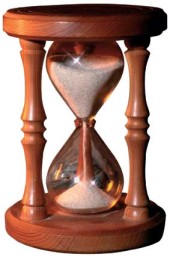
My father, who could be both loving and dismissive in equal measure, took stock of me at fourteen and made an assessment which has haunted me ever since. It was at the beginning of my “difficult period,” although I’m pretty sure everyone has a difficult period around that age. Along with the typical tiny rebellions against authority and wild swings of emotion, I had begun to do badly in school, which caused no end of concern in a family where education was highly prized and grades were the main metric of personal growth.
I should be a little more accurate: Most of the concern came from my mother, who was endlessly anxious about the prospects of her children and who observed my budding self-destructive streak with a sense of hopelessness and heartbreak. I don’t think I can fully appreciate how much trauma I put her through even now; I was certainly not paying it much attention back then.
My father, on the other hand, viewed the situation with a large degree of detachment. He had by that point proven himself a success in his chosen field, and had the air of equanimity one finds in those who have achieved the goals they set early in life and are aware that they have already won the game. Things had worked out for my father. If they did not work out for me it would be unfortunate, but it wasn’t something that would detract from his own victories. He could afford to be less apprehensive than my mom.
We were sitting at the dinner table one night, discussing yet another minor transgression for which I had been disciplined by school authorities. I believe my mother was crying. My father, probably in an attempt to convince her that he could help me through my struggle (but more likely because he wanted the crying to stop and figured that the best way to do that would be to take the control of the conversation), gave me a speech about the importance of appearances, of how there are things we don’t want to do but have to anyway and that often it is easier to simply do those things and be on your way than to push against them, be sanctioned, and still be forced to do them just the same.
“I mean, what do you want to do with your life? How do you think you’re going to get away with not following the same rules as everyone else?”
“I’m gonna be a writer,” I mumbled.
This was not something I had said out loud since early childhood, when your future career changes at least once a day. But I had been thinking about it. Even with my troubles in school, writing was still an area where I flourished, perhaps because the rubrics with which its success was measured were less constrictive than those in other subjects.
“I’ll write a book,” I added. I was probably trying to convince myself more than I was the rest of the table.
My father eyed me coolly. He liked me, my father, I never had any doubt of that. He saw a lot of himself in me: the cruel wit, the quickness with a joke, the brooding cynicism. If I had also inherited my mother’s emotional insecurities, so be it; at least his qualities were the ones that had proven dominant so far. His disappointment sprang from the fact that while I had taken on the sharper aspects of his personality, I had none of the leavening traits that made so many people genuinely care for him even though he could indeed be very vicious at times.
In any event, he looked at me, sized me up, and uttered the phrase that still burns at the back of my brain whenever I remember it.
“You’ll never write a book,” he said evenly. “You’ll be a character in bunch of other people’s books, but you’re never going to write one yourself.”
And there it was: loving and dismissive at the same time, and sadly accurate. As the years went on I abandoned any hopes of proving him wrong. The old man knew what he was talking about, and because of that I made the choices that brought me to the place where I am now.
Ya like that? It’s fiction! Well, mostly. Anyway, I’ve never really had an urge to write a novel, but reading Sam Tanenhaus’ argument that novelists’ best work is done before 40 got me thinking: I don’t have a lot of time left. If I want to write a great novel I’ve got to get cracking, like, now. I’m thinking of using that bit above as a starting point, but I worry that it’s a little too insular and not commercial enough. Maybe I’ll go with something about sexy sex vampires instead. Or international art thieves, that could be interesting!
Ah, who am I kidding? I’m just gonna keep blogging and then die. Those of you who do harbor aspirations in the direction of fiction, though, should consider yourselves warned. You’d better hurry up. If you need a little help, feel free to base one of the characters in your book on me. I pretty much write myself.
